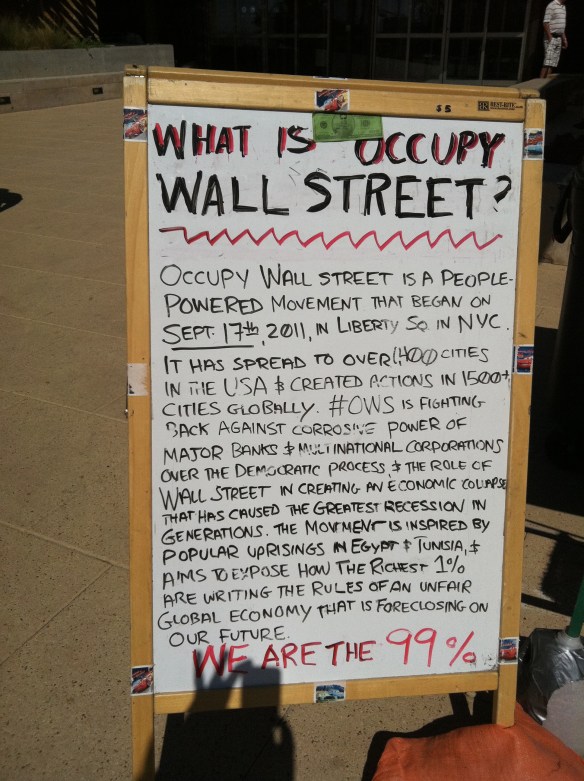Occupy Austin’s encampment at City Hall has been evicted. Occupy Wall Street has a dwindling number of protesters due to the season in NYC. It seems that the movement is fizzling.
Or not. Maybe it’s simply regrouping to come back in another form. The issues certainly haven’t gone away.
I notice a little more attention being paid to the vocabulary of political candidates, especially one poignant observation that the two-word phrase missing from any Republican candidate’s speechifying are these two words: middle class.
Why isn’t more of this political season devoted to which candidates support/oppose Citizens United and campaign finance reform? Because if they don’t vocally oppose them, they are comfortable lining their pockets with corporate money and being part of the corruption that has overtaken our government.
The Occupy movement got lots of criticism for being unfocused, for not having good sound bites. If you’re still wondering what it was/is about, I came across this article summarizing the 10 clearest demands of the movement.
Number one? Too much money in politics.
If there was a specific piece of government action that was most derided (directly or indirectly) by OWS protestors, it was Citizens United v. FEC. For a bunch of highly-educated justices, the Citizens United decision was staggering in its boneheadedness. Long story short, the court ruled that corporations have the same free-speech rights as individuals, and basically turned on the biggest spigot of private money into politics in recent memory. Oh, and it also expanded the definition of Corporate Personhood to absurd new heights.
Unsurprisingly, people weren’t too happy about the fact that no matter how much they canvassed, voted, donated to political campaigns or argued on the internet, they can never match the millions that private companies can muster. Bought politicians were unwanted before Citizens United, but afterwards it seemed blatant — like they weren’t even bothering to pretend anymore. Many OWS protestors took to the streets because they feel like we are now living in a country with two classes of people: those without money and those who matter to politicians. It’s so absurd because, as one anonymous commenter put it: “I’ll believe a corporation is a person when one is executed in Texas.”
If the 70% of the people who for years have believed that government is headed in the wrong direction could focus together and elect/support policymakers to overturn Citizens United and enact campaign finance reform, well, we the people will have taken our country back.
Is that not what you really want — government of the people, by the people, for the people? I do.
How do we get this done? It is daunting, but I cannot say it’s impossible. And I’m open to ideas.
Here’s one thing you can do: You can support, campaign, and vote for candidates who support these two policies, who make them their top priority, who can stand in the face of opposition, corruption, and greed. They’re out there. I know it.
We can make “where their campaign money comes from” a litmus test for candidates. Here’s an organization working on showing where the money really comes from.
I wonder how unbought candidates can gain a toehold in the media and get their message across to voters. Wealthy interests will of course fund their opponents, who can buy ad time and image consultants and speech writers.
Facebook, Twitter, and door-to-door campaigning, maybe?
For this “revolution” to happen, it’s gonna have to be mostly grass-roots, which Occupy showed us could be done. The concept and phrase “the 99%” is not going away, and it has made a difference.
It’s just gonna take even more of a revolution in people’s minds, hearts, and resolve to make these changes.
Supporting a truly free press is important. This table ranks nations on democracy, free press, and corruption. The U.S. is still better off than most nations, and that needs to be said. But we are less democratic, free, and uncorrupt than we like to think.
Where do you want it to go from here?
A friend asked what you call a government that caters to corporate interests. I looked it up on Wikipedia (political systems): it’s mostly plutocracy (rule by wealth — corporate interests, Koch Bros.), and I see elements of oligarchy (rule by the few — who buy politicians) and theocracy (rule by “God” or “his” representatives — Christian right) influencing it.
There are some elements of fascism (rule by a leader) in the way people’s civil rights have been taken away in the name of counter-terrorism. And there is also some technocracy/plutocracy (rule by wealthy experts) in the way that Wall Street provides the government’s economic experts and directs economic policy.
So there you have it: we live in a pluto-oliga-theo-fasci-technocracy.
If you’re wondering where your politics lie on the spectrum, go to The Political Compass. (Thanks, my friend, for telling me about this.) You answer the questions to view a chart showing where your politics lie on the left-right, authoritarian-libertarian axes.
I’m a far left libertarian in my politics, more than radical than Gandhi or any candidate or party shown. This doesn’t surprise me, because I came of age in terms of political awareness and involvement in the late 1960s and early 1970s.
I was told back then that the FBI had a file on me for protesting Vietnam. In high school. In Stillwater, Oklahoma.
Remembering that, my eyes are rolling. I’m coming out of the closet about that. And I ain’t done yet.

